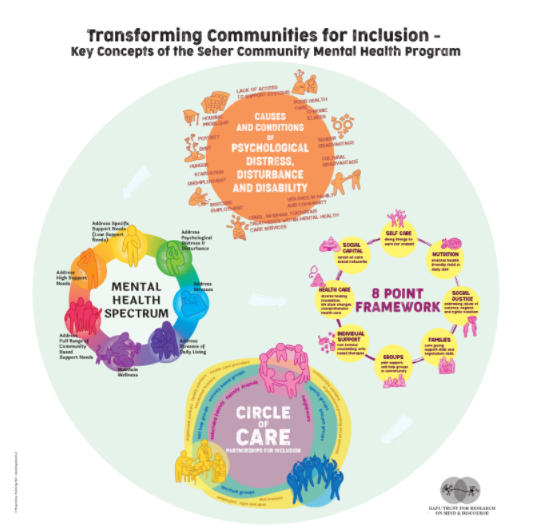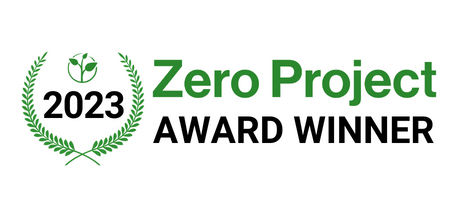Seher Community Mental Health and Inclusion Program
If we ask the question, ‘What is the right treatment for mental illness?’ answers will be in the direction of a restrictive medical model. If however, we ask the question, ‘What is the process of inclusion of persons with mental illness / disability?’ answers will be multifold, in the direction of living a life, opening many doors within Development.
The Bapu Trust intensively engaged with United Nations Convention on the Rights of Persons with Disabilities, reframing its View and Methods from “mental health” to “disability inclusive development”. Seher Community Mental Health and Inclusion program was started
with the specific purpose of CRPD compliance and zero coercion in mental health.
The
Vision of the Seher program is
‘Creating psychologically sustainable communities’.
The
Mission of the Seher Urban Community Mental Health and Inclusion program (UCMHI) in low income communities (slums) is,
to enable communities to be psychologically contained, their emotional needs met, being tolerant and inclusive of the mental health needs of a diversity of people, including those with intellectual and psychosocial disabilities.
Through concerted multi level actions, and enculturing a very high level of partnerships, both government and non-government, Seher facilitates the creation of caring communities.
Seher works in around 25 low income communities of Pune through 5 nodal centers and 10 additional wellbeing / awareness outreach points, covering a population of approximately 800000 people. A bridge with the Pune mental hospital has been built through the “Going Home Project”, towards de-institutionalization and resettlement of women in the institution.
Persons with psychosocial disabilities within low income communities are placed at the intersection of multiple marginalizations (economic, caste based, gender and religious). The community mental health and inclusion program works at these intersections on the inequalities persons with psychosocial disabilities experience within communities. The program works towards the goal of
community transformation, planning the outcome of inclusion and full participation of persons with mental health problems and psychosocial disabilities, other than providing dozens and dozens of self care, recovery (as self driven) and wellbeing options.
The Seher program is built upon
principles of psycho-social entrepreneurship, i.e.
“multiplying emotional resources through community participation, to enable the full inclusion and participation of people with diverse needs”.
Seher
multiplies emotional resources using the following key strategies of-
- capacity development of local neighbourhood psychosocial support networks, both formal and non-formal
- partnering extensively with local government, non-state organised actors, and a variety of informal community actors, thereby animating the inclusion of persons with disabilities within development
- preparing grassroots communities for giving care and support for people with mental health issues and / or having psychosocial disabilities
- providing specific well being services to address diverse needs using comprehensive health care, psychosocial, arts based and community development modalities
- continuously applying project management principles to research and monitor our work, impact and outcomes, and to advocate policy change
- continuously applying self evolution principles for upgradation of staff wellness and their professional development, through OD works
The program has a two tier system of service delivery: one, a basket of home based psychosocial services provided by non formal care givers; two, formal care services (referral services, social services, medical and psychosocial clinical services and AYUSH). Roles, Tasks, Monitoring & evaluation, and mentorship are clearly defined, along with trainings and continually developing professional skill sets.
Mental Health Spectrum
The Mental Health Spectrum helps assess the psychosocial needs of an individual and is used extensively. It is a dynamic scale allowing an understanding of all psychosocial needs (including development needs, barriers to full participation and Human Rights needs) of a person. It reflects the aspect that mental health is a dynamic state of being and is never static.
Following consent of the person to register into the program, holistic assessments are conducted and intervention plans are prepared for each person in accordance with their needs. Needs could be social, economic, support orientated, nutritional, or familial, etc. Enabling decision making with the client is a large part of work with clients within the program, ensuring choice and respect at each point of the decision making process. Client work plans are assessed every month through a client tracking system and intervention goals are revised in accordance with shifts, choices and needs of the clients. All data is entered into a comprehensive MIS, and analyzed on monthly and yearly basis for learnings about the program.
8 Point Recovery Framework
The services encourages recovery of persons with psycho-social disabilities through provision of services through an Eight Point Recovery Framework. The framework is a locally developed model, studied for its effectiveness. Work under the eight domains includes:
- Self and Self Care
- Nutrition for mental health
- Inclusion actions
- Family and Community engagement
- Peer Support
- Accelerating individual strengths and resilience
- Comprehensive health care and access to wellbeing services, including indigenous medicine
- Enhancing social capital
Support systems
A range of intervention actions have been used to keep the program committed to the core value of “zero coercion” and CRPD compliance. Seher works exhaustively on support systems, including peer support, group support, negotiating family systems, supporting a person through crisis (defined as high restriction of participation) and transforming communities through creating circles of care, especially in crossing over high restriction in participation.
Lived experience
The program recognizes and builds upon the lived experiences of persons with psychosocial disabilities. “Experts by experience” are engaged and employed at all levels of the Seher program.


